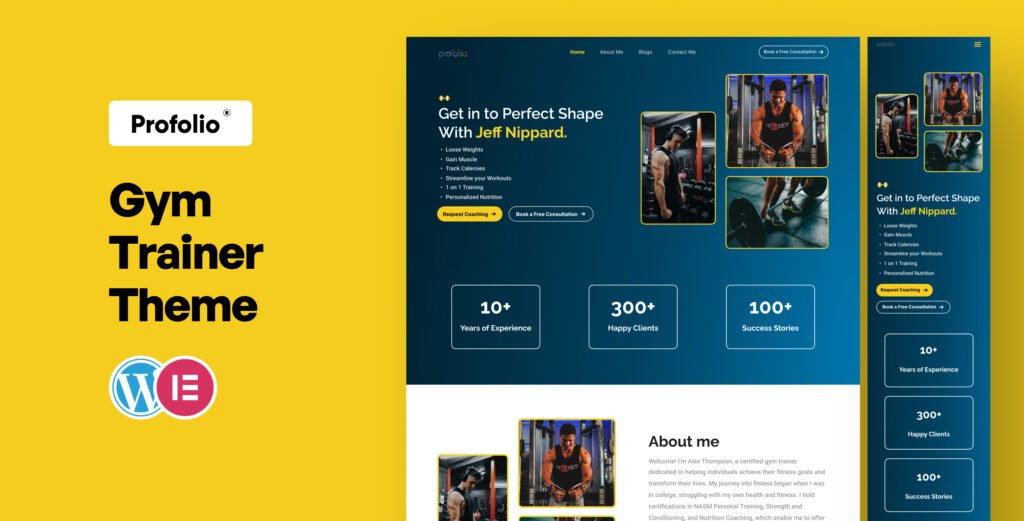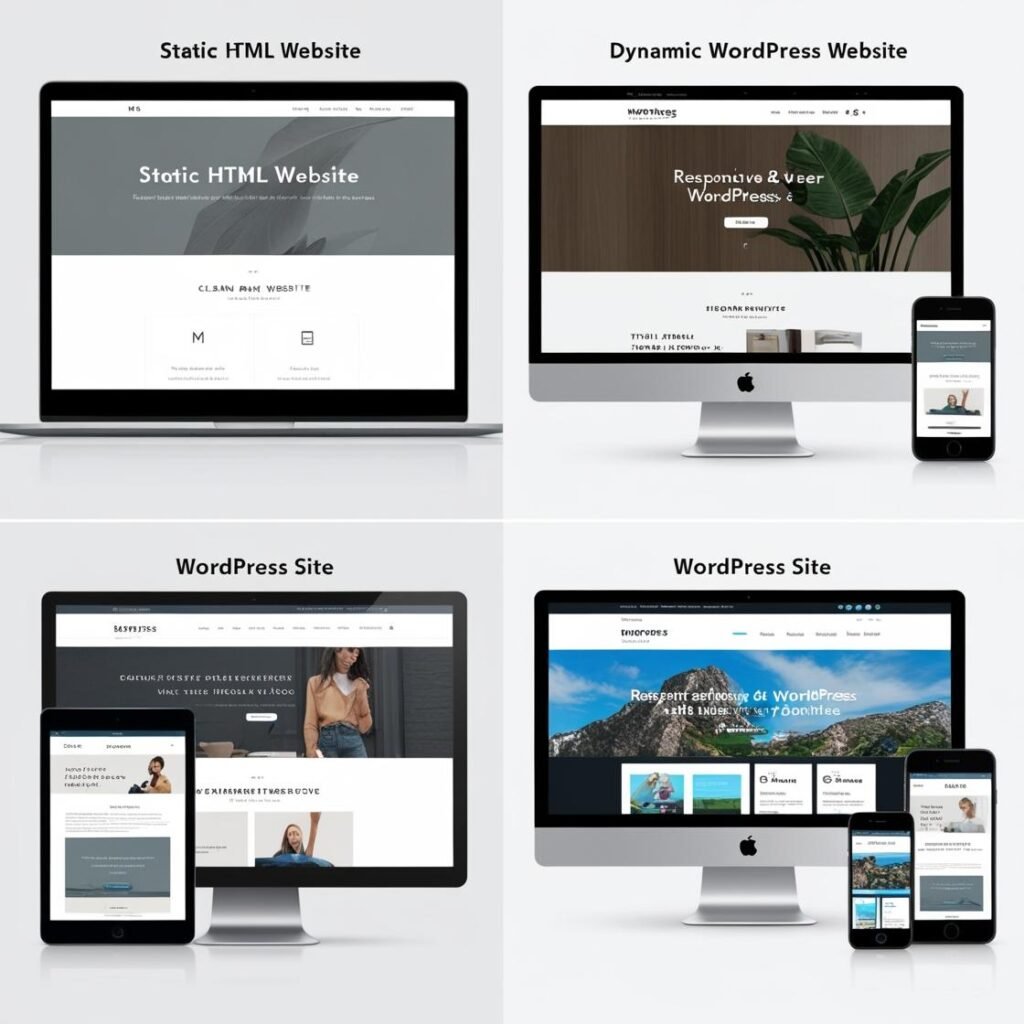Introduction
WordPress is a robust content management system (CMS) that has significantly transformed the landscape of website development. Originating in 2003 as a simple blogging platform, WordPress has evolved into a sophisticated CMS used by millions worldwide to create, manage, and modify websites with ease. Currently, WordPress powers over 40% of all websites on the internet, a testament to its capabilities and popularity among developers and non-developers alike.
The significance of WordPress in website development can be attributed to its user-friendly interface and extensive customization options. Built with open-source technology, it allows developers to create anything from simple personal blogs to complex corporate websites without extensive coding knowledge. With thousands of themes and plugins available, users can enhance their frontend websites easily, tailoring them to suit specific needs and preferences. This flexibility is one of the key reasons why WordPress is frequently the platform of choice for both beginners and experienced developers.
Learning to develop on WordPress can be a valuable skill in today’s digital age. As businesses increasingly shift their operations online, the demand for skilled WordPress developers continues to grow. Armed with knowledge about WordPress development, individuals can pursue a variety of career paths, including roles as freelance developers, website designers, or even full-time positions within companies seeking to establish a strong online presence. Moreover, the ability to build and optimize WordPress websites allows professionals to create a portfolio of work that showcases their skills and capabilities.
Choosing the right training course to develop expertise in WordPress is crucial to succeed in this domain. As online learning becomes more prevalent, and with the variety of options available, selecting a course that aligns with your goals and learning style is essential. Investing in a solid foundation in WordPress development will provide you with the tools and skills necessary to excel in this dynamic field.
Assessing Your Skills and Goals
Before embarking on a journey to enhance your expertise in WordPress development, it is essential to evaluate your existing skills and establish clear goals. Understanding your current level of proficiency will help you select an appropriate course, ensuring that the content aligns with your capabilities.
Individuals interested in front-end website development typically fall into three main categories: beginner, intermediate, and advanced. Beginners possess little to no experience and may be unfamiliar with web development concepts. They should focus on foundational topics like HTML, CSS, and the basics of WordPress. Intermediate learners likely have some familiarity with these technologies and may seek to deepen their knowledge by exploring more complex themes, plugins, and customization options available within the WordPress development ecosystem. Advanced learners, on the other hand, may already have a comprehensive understanding of front-end development and might be looking to specialize further, perhaps by learning about website optimization, security, or advanced coding practices.

Setting realistic learning objectives is crucial for effective skill development. Consider what you aim to achieve through the course. Are you looking to create a personal blog, develop professional websites for clients, or perhaps build a portfolio demonstrating your expertise? Identifying your primary objectives will help shape the direction of your learning experience. It is also advisable to create a roadmap that outlines the skills you wish to acquire, while keeping in mind the time and resources you can dedicate to the course. This thoughtful process of self-assessment not only aids in selecting the right course but also enhances motivation and engagement throughout your WordPress journey.
Types of WordPress Website Development Courses Available
When seeking to enhance your skills in WordPress development, it is essential to explore the various types of courses available. WordPress development courses can be broadly categorized into free versus paid options, as well as online versus in-person classes. Each type has its unique advantages and disadvantages, catering to different learning preferences and objectives.
Free courses often provide an enticing entry point for beginners. Many platforms offer accessible materials that cover the fundamentals of WordPress development, including theme customization and basic plugin usage. While these options allow learners to explore at no cost, they may lack comprehensive content and direct support from instructors. This could hinder deeper understanding for those who prefer structured learning paths or need immediate assistance with complex topics.
In contrast, paid courses tend to offer a more in-depth curriculum, often including personalized mentorship or community support. These courses can range from basic website management to specialized training in theme or plugin development. The investment involved can be justified by the higher quality resources and access to experienced instructors, who can provide guidance tailored to your specific interests in front-end website development.
Another important distinction is between online and in-person classes. Online courses are flexible and allow individuals to learn at their own pace, making them ideal for busy schedules. They often feature a variety of multimedia resources, including videos, quizzes, and forums for discussion. Conversely, in-person classes may foster a more engaging learning environment through face-to-face interactions, enabling immediate feedback and collaboration among peers.
Read Also: How to Download HTML Pages from 400+ Websites: A Step-by-Step Guide
Ultimately, selecting the appropriate type of WordPress development course hinges on personal goals, learning preferences, and available resources. Understanding the advantages and disadvantages of each category will empower learners to make informed decisions, ensuring a productive educational experience in the realm of website management.

Criteria for Choosing the Right Course
When selecting a WordPress website development course, it is essential to consider various criteria that can substantially influence your learning experience and outcomes. First and foremost, examine the course curriculum. A comprehensive curriculum should cover both fundamental and advanced topics, including WordPress installation, theme customization, plugin development, and best practices in frontend website design. Ensure that the course is up to date with the latest industry trends and technologies, as WordPress is continually evolving.
Instructor qualifications represent another crucial criterion. Look for courses taught by experienced professionals with a solid understanding of WordPress development. Instructors should ideally have a combination of academic qualifications and real-world experience in developing and managing WordPress websites. Their backgrounds can provide critical insights and practical knowledge that can enhance your learning.
The course duration is also important. Choose a course that aligns with your schedule and time commitment. Some courses offer flexible pacing, enabling students to progress at their own speed, while others may have a fixed timeline. Consider how much time you can dedicate weekly to training and choose accordingly.
User reviews and testimonials can also provide valuable insights into the effectiveness of the course. Evaluate feedback from previous learners to gauge their satisfaction and the level of practical application they derived from the course. Moreover, check if the course offers any form of support, such as access to a forum, mentorship, or Q&A sessions, which can greatly enhance your learning experience.
Lastly, consider the potential for certification upon course completion. Certifications can bolster your credibility as a WordPress developer and may open up new job opportunities. By considering these criteria, you can effectively compare different courses and make an informed decision that aligns with your personal and professional goals in WordPress development.
Platforms Offering WordPress Development Courses
In the digital age, numerous online platforms offer comprehensive courses on WordPress development, making it easier for individuals to build a strong foundation in creating and managing frontend websites. Among the most popular platforms are Udemy, Coursera, and LinkedIn Learning, each providing unique features and course offerings tailored to different learning styles and levels.
Udemy is well-regarded for its vast catalog of courses, including many focused on WordPress development. With options ranging from beginner to advanced levels, prospective learners can find classes that focus specifically on frontend design or more technical aspects of WordPress. A standout course is “WordPress for Beginners – Create a Website Step by Step,” which offers a hands-on approach to building a website from scratch while covering basic principles of WordPress development.
Coursera partners with leading universities and organizations to provide high-quality courses. Its “WordPress Toolkit” course is noted for its rigorous curriculum that not only teaches WordPress development but also delves into optimizing websites for various user experiences. This course is ideal for learners who appreciate structured learning endorsed by reputable institutions.
LinkedIn Learning is another excellent platform, offering courses like “Learning WordPress 5” which helps users navigate the latest version of the platform. Each course features brief video lessons alongside practical exercises that foster skill retention. Additionally, LinkedIn Learning uniquely allows users to connect their learning progress to their professional profiles, showcasing their new skills in WordPress development to potential employers.
Overall, the wide range of platforms ensures that anyone looking to partake in WordPress development education can find a course that meets their needs, whether they’re seeking to create a new frontend website or enhance an existing one. These platforms not only deliver content but also equip learners with the necessary skills to thrive in web development.
Budgeting for Your Course Purchase
When considering the acquisition of a WordPress website development course, it is imperative to meticulously set a budget that adequately reflects both the course’s primary costs and any supplementary expenditures that may arise. The primary outlay will typically encompass the price of the course itself, which can vary significantly depending on the institution, course length, and depth of content. Prices may range from free resources to several thousand dollars for in-depth training predominantly delivered by reputable providers.
In addition to the upfront costs of the course, prospective students should account for potential additional expenses. For instance, as you progress in your training, you may find the need to invest in various plugins and themes. These elements are crucial for enhancing the functionality and visual appeal of your front-end website. Depending on your specific project requirements, such add-ons can add up, so it is wise to allocate funds for these purchases in your budgeting plan. Furthermore, if your course requires you to host your own WordPress website, select an appropriate hosting service, which also represents a recurring cost that should be factored in.
Another useful strategy involves exploring discounts and promotions offered by course providers. Many platforms frequently run sales or provide promotional codes that can considerably decrease the course fees. Subscribing to newsletters or following these providers on social media can keep you informed about such opportunities. Additionally, consider joining online forums or groups dedicated to WordPress development; members often share exclusive deals or referrals that can lead to reduced course costs. Ultimately, a well-constructed budget not only prepares you for the financial aspects of your WordPress website development education but also ensures you maximize your learning experience within a reasonable financial framework.
Preparing for the Course: Tools and Resources Needed
When embarking on a journey to enhance your skills in WordPress development, having the right tools and resources at your disposal is paramount. The preparation stage can significantly influence the effectiveness of your learning experience and ensure a smooth transition from theory to practical application.
Firstly, it is essential to have a reliable computer that can efficiently run the necessary software. A modern laptop or desktop with sufficient processing power and memory is recommended to accommodate various tasks involved in front-end website development. Alongside this, a stable internet connection is vital for accessing online resources, tutorials, and downloading necessary software.
Next, you will need a local development environment, which allows you to build and test your WordPress website before making it live. Popular tools for this purpose include XAMPP, MAMP, or Local by Flywheel. These applications simulate a server on your computer, facilitating a convenient and safe development space. Familiarizing yourself with an Integrated Development Environment (IDE) or code editor, such as Visual Studio Code or Sublime Text, will also aid in writing and managing your code efficiently.
Additionally, selecting a suitable hosting service is critical for deploying your front-end website once your development is complete. Various hosting providers cater specifically to WordPress, such as Bluehost, SiteGround, or WP Engine, offering user-friendly interfaces and automatic updates to streamline the process.
Equipping yourself with theme frameworks, such as Elementor or Divi, can enhance your design capabilities. Furthermore, it is advisable to install essential plugins that facilitate various functionalities, including SEO optimization, security, and performance enhancements. Popular plugins like Yoast SEO, Wordfence, and WP Super Cache can be indispensable in optimizing your site.
In summary, preparing for your WordPress development course involves gathering the right tools, software, and resources to ensure a comprehensive learning experience. By investing time in this preparatory phase, you will be better equipped to navigate the complexities of front-end website development effectively.
What to Expect from a WordPress Development Course
When enrolling in a WordPress development course, students can anticipate a structured and comprehensive learning experience designed to equip them with essential skills and knowledge in creating and managing a frontend website. Most courses will offer a mix of video lectures, written materials, interactive assignments, and quizzes that ensure an engaging learning environment. These elements serve to cater to different learning styles and help reinforce key concepts associated with WordPress development.
The duration of these courses may vary significantly; typically, they range from a few weeks to several months. Each course is organized into modules or sections that build upon one another, gradually increasing the complexity of the topics covered. Introductory modules often focus on the fundamentals of WordPress, including installation, configuration, and basic theme customization. As the course progresses, more advanced topics such as plugin development, SEO optimization, and security practices for a frontend website may be introduced.
Interaction with instructors and peers is another critical aspect of a quality WordPress development course. Many platforms offer forums, live Q&A sessions, or dedicated channels for students to discuss their projects and seek assistance. This not only helps to clarify doubts but also fosters a community of learners who can share insights and experiences. Additionally, students may receive constructive feedback on their work, which is invaluable for their professional growth.
Common skills taught in these courses include working with different themes, customizing layouts, understanding HTML/CSS, and utilizing popular plugins. Other important areas of focus may involve performance optimization and eCommerce setups. Overall, a well-rounded WordPress development course promises to equip students with practical skills necessary for designing and managing effective frontend websites.
Post-Course Steps: Implementing Your Knowledge
Completing a WordPress development course is a significant achievement, but the journey does not end there. It is imperative to take actionable steps to implement the skills acquired during the coursework. First, one effective strategy is to practice by building your own frontend website. This hands-on experience will reinforce your understanding of core concepts, enabling you to troubleshoot common issues and experiment with various design elements.
Building a portfolio is another crucial step for anyone looking to establish a career in web development. As you develop your frontend website, document your process and final results. Include a showcase of projects from your WordPress development course that demonstrates your capabilities, incorporating aspects such as layout design, responsiveness, and plugin integrations. A well-curated portfolio can significantly enhance your visibility to potential clients or employers.
Next, consider seeking freelance opportunities or full-time positions that allow you to leverage your newly acquired skills. Websites dedicated to freelance gigs, such as Upwork or Freelancer, offer numerous opportunities for beginner developers. Even small projects can provide valuable experience while helping you build a robust professional network within the web development community. Additionally, these experiences can highlight the practical applications of WordPress development methodologies you have acquired.
Continuing education is also vital in the ever-evolving field of web development. Engage with online learning platforms to explore advanced topics, participate in webinars, or follow reputable blogs that cover new trends and technologies. This ongoing learning process ensures that your skills remain relevant and competitive.
Finally, connect with the web development community. Forums, local meetups, and social media groups dedicated to WordPress are excellent avenues for networking, sharing experiences, and gaining insights from seasoned professionals. Building relationships in these communities can provide mentorship opportunities and lead to job referrals.


